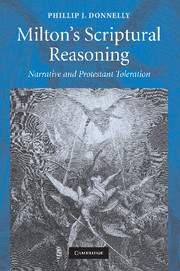Book contents
- Frontmatter
- Contents
- Preface and acknowledgments
- Abbreviations and editions
- 1 Introduction: Scriptural reasoning
- PART I SCRIPTURAL REASONING IN MILTON'S PROSE
- PART II BIBLICIST RHETORIC AND ONTOLOGY IN PARADISE LOST
- PART III BIBLICIST POETICS AND HERMENEUTIC ETHICS
- Part III introduction
- 8 Biblical metanarrative as rule of faith
- 9 Paradise Regained as rule of charity
- 10 Samson Agonistes as personal drama
- Notes
- Subject index
- Index of Scripture references
8 - Biblical metanarrative as rule of faith
Published online by Cambridge University Press: 04 September 2009
- Frontmatter
- Contents
- Preface and acknowledgments
- Abbreviations and editions
- 1 Introduction: Scriptural reasoning
- PART I SCRIPTURAL REASONING IN MILTON'S PROSE
- PART II BIBLICIST RHETORIC AND ONTOLOGY IN PARADISE LOST
- PART III BIBLICIST POETICS AND HERMENEUTIC ETHICS
- Part III introduction
- 8 Biblical metanarrative as rule of faith
- 9 Paradise Regained as rule of charity
- 10 Samson Agonistes as personal drama
- Notes
- Subject index
- Index of Scripture references
Summary
In the final two books of Paradise Lost the deployment of typology becomes more explicit than in the preceding books. In those earlier books, as we observed in Chapters 5 and 6, Milton deploys typology at key points to disclose what I call “ontic charity”: that is, to reveal that reality subsists not in an opposition between coercion and chaos but in a genuinely free and peaceful gift for the good of others. Such ontic charity is made possible, in Milton's account, by the first gift of peaceful difference who is the Son of God, or Divine Reason. As we now focus on the last two books of Paradise Lost, we find that, as the typology becomes more explicit in the narrative, the treatment of charity shifts from the earlier emphasis upon ontology to the ethical and hermeneutic implications of belief in the primacy of peaceful gift. In effect, Adam's post-lapsarian education in Books 11 and 12 model how typology is a Christocentric reading of the larger biblical story, the purpose of which is to enable (after repentance and regeneration) faith in the Messiah, which, in turn, gives rise to the ethical practice of charity. As we discovered in Chapter 3, the core of Milton's arguments against religious coercion among Protestants is his insistence upon the right relation, not mere disjunction, between precisely such saving faith and consequent ethical charity.
- Type
- Chapter
- Information
- Milton's Scriptural ReasoningNarrative and Protestant Toleration, pp. 172 - 187Publisher: Cambridge University PressPrint publication year: 2009

